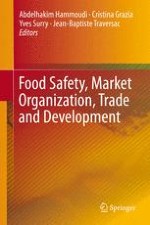2015 | OriginalPaper | Buchkapitel
5. On the Emergence of Private Standards: An Industrial Organization Approach
verfasst von : Abdelhakim Hammoudi, Cristina Grazia, Oualid Hamza
Erschienen in: Food Safety, Market Organization, Trade and Development
Aktivieren Sie unsere intelligente Suche, um passende Fachinhalte oder Patente zu finden.
Wählen Sie Textabschnitte aus um mit Künstlicher Intelligenz passenden Patente zu finden. powered by
Markieren Sie Textabschnitte, um KI-gestützt weitere passende Inhalte zu finden. powered by
